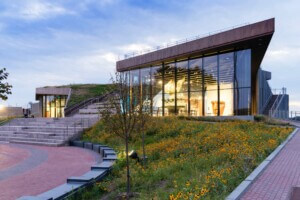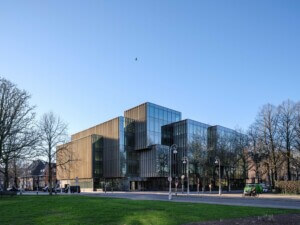The role of glass continues to expand in architecture as new performance properties and aesthetic qualities come to market in a steady flow. From photovoltaic glazing to printing technologies that address the issue of avian impacts, the material has become an active, dynamic force in buildings.
SunGuard SNX 51/23
Guardian
For commercial use, this high-performance, low-E glass has a VLT above 50 percent and a solar heat gain coefficient below .25.
Solarban z75
PPG
Featuring a neutral, cool-gray tint, this low-emissivity glass offers an intelligent combination of visible light transmittance, solar control, and light control.
View Dynamic Glass
View
As the sun intensifies, a nanotech interlayer regulates an electric current that shifts ions in the glass, automatically darkening them. Offered in panels up to 5 feet by 10 feet.
Ornilux Mikado
Arnold Glas
This bird-protection glass features a patterned UV coating that is visible to birds, but virtually transparent to the human eye.
i-Glass
Oldcastle BuildingEnvelope
This screenless technology can print multiple colors and complex designs on exterior and interior glass.
LightZone
SageGlass
Variable tint zones within a single pane of electrochromic glass allows great flexibility for managing solar heat gain and glare.
CLASS Sapphire
Saint Gobain
In sheets up to 9 inches by 26 inches and 12 inches by 24 inches, this transparent ballistic-resistant material achieves a 40 percent lighter and 40 percent thinner system than a glass-only design.
DigitalDistinctions Etch Ink
Viracon
This ink simulates the look of acid-etched or colored-etched glass without high-pressure sand blasting or dangerous acids.










